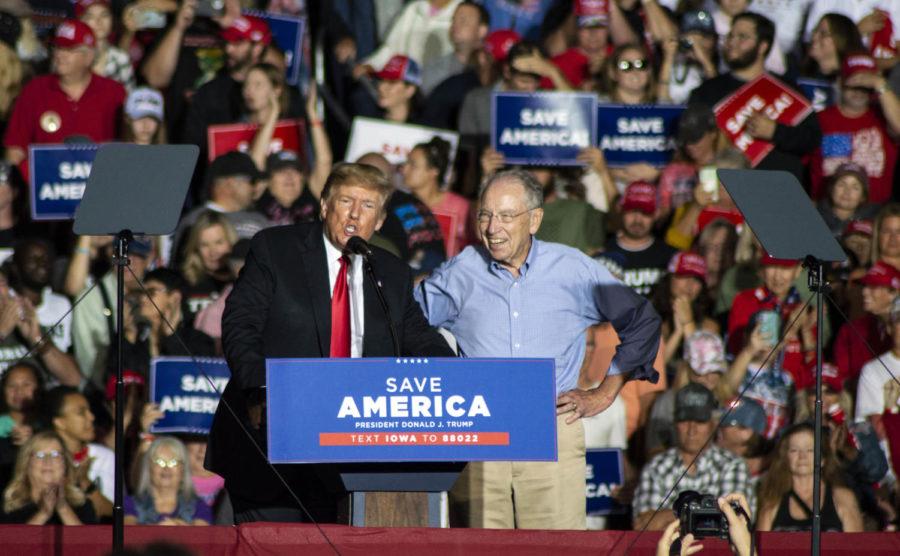Haueter: When freedom of the press became intimidation of the press
October 14, 2021
On Oct. 9, I attended the Save America rally in Des Moines with two other editors to cover the event. This was not my first time covering a Trump event, but all the previous events I had covered had been while he was the president.
Naturally, I expected security at the event to be significant. After all, he is a former president and celebrity figure.
The security I was met with was nothing like I expected.
Before press members were allowed into the rally, we were pulled aside and had to do the normal routine — take your bag/backpack off, open the pockets and empty them. Set it all on the ground as well as cameras and other equipment. All of this was done under the supervision and direction of Secret Service agents, not private security.
What I didn’t expect was to be told (not asked) to open up my computer, log in, then show the agents various different areas of my computer.
First, I was told to open any tab, so I clicked my tab opened to Google Drive. Then, the agent pointed to my Gmail tab and asked to see it, so I clicked it without opening any emails. I was then told to show him my search history, which I also complied with.
Finally, the agent asked me to open up my podcasts. This was the most puzzling request to me. I wasn’t connected to Wi-Fi because it wasn’t provided, and I didn’t have Spotify already open, so I wasn’t able to do that. When I told him I wouldn’t be able to do that because I didn’t have an internet connection, he looked at me for a couple of seconds, then said I was fine.
Our photojournalist was also told to open up their camera and click through their photos.
They then told us to leave our stuff on the ground, back away and go through the metal detector and the typical security measures.
Though this happened with a group of other reporters, I don’t know if they were asked to go through their computers in as much detail as we were. I know that reporters covering the rally from The Daily Iowan, Carroll Times Herald and the Des Moines Register did not experience this.
I felt as if I was being intimidated. I was scared. I didn’t feel like I had the option to say no. Was I, a 21-year-old woman, supposed to speak up against large older men acting behind the shield of being national authority figures?
What were they looking for? Proof that I was, in fact, a human being with my own opinions that may or may not be different from those of the former president?
If they had found this ‘proof,’ would they have barred me from covering the rally?
In a call Friday morning, Sommer Ingram Dean, an attorney from the Student Press Law Center, was shocked when I explained what happened.
“This sounds like a textbook unreasonable search. We’ve seen law enforcement officials grossly abuse their power in these contexts before, especially when it comes to reporters, but I’ve never heard of this,” Dean said.
Inflammatory rhetoric against the media has become normalized and even encouraged in some instances. During the George Floyd protests, we saw a local journalist get arrested, charged and put on trial.
At the rally, a man stood next to the press area the entire night wearing a shirt that said “media is the enemy of the people.”
We are not your enemy.
Yes, there are media outlets with nefarious intentions, but the vast majority of us are here to serve you and to hold those in positions of power accountable. Please don’t feed into the normalization of journalists being the enemy, and please don’t enable those powerful figures to intimidate us out of doing our jobs.
I can’t say that’s what these agents were trying to do because I don’t know their intent. I can’t look into their brains and know why they felt it necessary to look through a student journalist’s computer. But it’s not a secret that Trump’s administration has a negative relationship with the media. At all of his rallies, he encourages the crowd to boo and jeer all of the media members in attendance.
Journalists, we have a right and a duty to the people of the United States. We also have a duty to inform the public of things that get in the way. Keep doing good work and continue to hold powerful people accountable. Freedom of the press is in the Constitution for a reason. Don’t let anyone convince you differently.

















